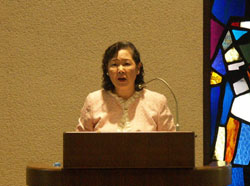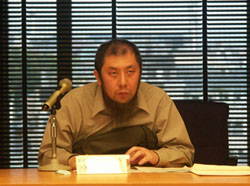Center for Interdisciplinary Study of Monotheistic Religions(CISMOR)Doshisha University
> Archives > 21st Century COE Program Archive > Research Groups > Research Group1 > 2005-0421st Century COE Program Archive
2005-04
| Date: | October 22, 2005 |
|---|---|
| Location: | Chapel in the Divinity Hall, Imadegawa Campus, Doshisha University Kanbaikan, Imadegawa Campus,, Doshisha University |
| Title: | "Jihad" in the Interpretation of the Qu'ran |
| Speaker: | Kazuko Shiojiril (Professor, Philosophy, Graduate School of Humanities and Social Sciences, University of Tsukuba) |
| Title: | Jihad and "Islamic World" |
| Speaker: | Ko Nakata (Professor, School of Theology, Doshisha University) |
| Summary: | |
| The lecture, entitled "Jihad from Interpretation of the Qur’an," was held at Doshisha University on October 22, 2005. The presenter was Professor Kazuko Shiojiri. The lecture was divided in three parts. The first part included a brief description of several verses of the Qur’an and some hadith which are often quoted when the jihad is discussed. Professor Shiojiri had doubts about the general translation of 'jihad' as 'holy war,' since only ten out of fourty-one verses in the Qur’an refer to the word as a fight. Next, she talked about the hadith "I return from the small war to the great war now," which the Prophet Muhammad is believed to have said after the conquest of Mecca. She interpreted this passage as saying that the fight with oneself and one’s desires is more important than fighting with an enemy on the battlefield. Besides this, she pointed out that the word 'jihad' is sometimes used to describe a war between Muslims in the Islamic world. The second part of the lecture took up the perception that "since Islam is allowing violence, Christianity is more peaceful than Islam." Against this, Dr. Shiojiri pointed out that Christianity also tolerates acts of violence. She exposed some biblical quotations justifying violence and the concept of 'Just War' which was theorized by Ambrose and Augustine in the late fourth and early fifth centuries. These concepts were used during 'the Crusades.' Then, Dr. Shiojiri enumerated some peaceful passages from the Qur’an, and reminded the audience that Protected People (dhimmi, ahl al-kitab, 'people of the book') lived peacefully under Ottoman rule. To conclude this part, she emphasized that such passages also might be interpreted as metaphors. The presenter developed the theme that "Islam is neither a religion of violence nor a religion of peace, it is a religion of order" in the third part of the lecture. She declared that the religion allows violence to maintain social order, which is an indispensable part of human society. Afterwards, the presenter and some participants moved to another room to take part in another discussion. Its point of departure was a report entitled 'Jihad: The Islamic World' by Professor Nakata Hassan Ko. Professor Nakata enumerated some Qur’an passages which concern the jihad as a major subject. Since an effort of non-Muslim parents to make their children change their religion from Islam to polytheism was named as a 'jihad' in Qur’an, Mr. Nakata criticized the translation of 'jihad' as a 'holy war.' Beside this, he proposed "struggle effort" as a Japanese equivalent of jihad. Next, He took up the issue of whether Islam allows violence or not, explaining that there are several kinds of jihad, such as a war against non-Muslims, self-defense, etc. Then, he remarked that Islam doesn’t only allow violence, but it also controls it. Moreover, he clarified the differences between a slave and a dhimmi (holders of Holy Papers) against the recent criticism in Japan that the situation of a dhimmi is the same as the "peace of the servant." He stressed that the latter is the name of non-Muslim citizens in Islamic rule, but the former can be Muslim or non-Muslim. Consequently, to call a dhimmi a ‘servant’ is wrong. After the presentation, all participants from different fields discussed "jihad" from various aspects. The main points of the discussion are as follows. First, the difference between Sunnis and Shiites was examined in the case of the war of Iran and Iraq. While there are considerable commonalities between the two sects, small differences exist, such as the fact that for Shiites, jihad cannot be started in the absence of an Imam. Besides this, the issue of war between Muslims was discussed. Attention was directed to the vagueness of calling such a fight a jihad. For example, Iran used the name "the war of self-defense" instead of jihad in the war between Iran and Iraq. Additionally, it was pointed out that the idea of jihad in Sufism must be considered too. For instance, some examples of jihad movements among Sufis, such as the Mahdi movement in Sudan, or the jihad of the Sanusi order and the Idrisi order against colonization in North Africa were mentioned. Lastly, further research problems were decided. Among others were the effects of pre-Islamic religions on jihad, the issue of martyrdom in the jihad, and the necessity for general understanding of the jihad in simple terms for Japanese people. Danismaz Idiris (COE Promoted Researcher, Graduate Student, Graduate School of Asian and African Area Studies, Kyoto University) |
|

